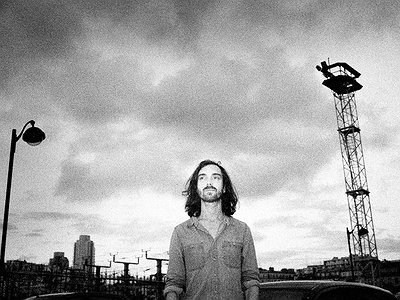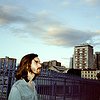Could you take us through a day in your life, from a possible morning routine through to your work? Do you have a fixed schedule? How do music and other aspects of your life feed back into each other - do you separate them or instead try to make them blend seamlessly?
Well, as a sound engineer, I am freelance. So, when I work it is intense and I don't have the energy to make music. Also, because I work with sound (sound design, live sound etc.) my ears are tired after work.
So basically, I do music when I don't work. I need the serenity to have nothing else to think about when I compose, so I can dive into it.
I try to make the administrative work, phone calls etc. on the morning and then I try to stick to music.
I have a lot of feedbacks between my sound engineer activity and music composition. Both feed each other deeply.
For example, when I work on some concerts with the GRM, I host the composers or sometimes I play their work on the Acousmonium (which is a complex and amazing set of speakers), so I listen to the music, analyze their work, how the spatialisation could fit the sound at best, listen to their rehearsal, traveling into the imaginary sound space, I can converse with them about how they work etc. At the end of the concerts I have my head full of sound ideas, and I’m impatient to go to my studio.
There are many descriptions of the ideal state of mind for being creative. What is it like for you? What supports this ideal state of mind and what are distractions? Are there strategies to enter into this state more easily?
For me, the ideal state of mind for being creative is being confident and lucid at the same time. You have to trust your feeling while keeping the big picture and some critical mind to keep asking what am I doing, where does it go, what works, what doesn't work and why?
The best conditions are in a studious place, like a studio (in case of a commissioned work for example like I did at the GRM), or what I do with some friends twice a year: a residency. We rent a big place at ten people for two weeks, each of us working on our own project. People's energy and focus sparkling around is a great stimulation for me. Plus, you show what you do to some watchful friendly eyes which is always fortifying.
Sometimes I’ll do yoga in the morning, it is very good but hard to do regularly for me.
The need for distraction comes when I lose the big picture of what I am doing and the pleasure to throw myself into the unknown.
How is playing live and writing music in the studio connected? What do you achieve and draw from each experience personally? How do you see the relationship between improvisation and composition in this regard?
Until now, the starting point was to record some improvisations (with the coils or the modular) to accumulate some rushes. Then I started to edit some fragments together, to find an organic coherency between them as they were only related by my intention, but not synchronized as in a partition or re-recording session. So, the “writing” was kind of reverted as it happened afterwards.
I started to make music the same way I did sound editing. The advantage is the precision, the infinite details and nuances you can put in your work. But it is quite laborious. It's like making a true painting out of a patchwork.
These days, I try to use more improvisation, to go to the instrumentalist side more than to to sound editor one. But what you gain in spontaneity, you can lose in stepping back from your work.
How do you see the relationship between the 'sound' aspects of music and the 'composition' aspects? How do you work with sound and timbre to meet certain production ideas and in which way can certain sounds already take on compositional qualities?
For what I do, this is one only thing. When your material is already “living”, the sound is in a way already composed. And composing includes mixing for me, which is adjusting the sound and the space: if you remove all the frequency above 200hz in a sound or you transpose it 2 octaves below, or if you keep only the reverb without the dry sound the composition changes, it is not the same music at all.
The “timbre” makes sense for simple sounds, or historically for instruments. But sometimes you use sounds that morphs, that are too complex, too dynamic to get a “timbre” attached to them.
Composing for me is about putting together the right sounds at the right moment the right way. Its more about assembling, articulating, harmonizing rather than making a partition whose realization will be done by the sound. The sound is somehow composed by the way I create or record it, but when I start actually “composing” I have all my rushes just like a film editor.
Our sense of hearing shares intriguing connections to other senses. From your experience, what are some of the most inspiring overlaps between different senses - and what do they tell us about the way our senses work? What happens to sound at its outermost borders?
Well this is a huge question. Discussing the outermost borders of sound would be too long. I think the main interaction in our culture is sound/vision. What I like about sound is, unless you cover your ears, you have to take it. There is no way to do something like “turn your eyes away”, “close your eyes”, hide something in the sound space.
It submerges you and goes straight to the inner space without any filter (except your own resistance and the cultural filter of your listening).
That is why sound can be such a nuisance. We have very little control over it. For example, when you record sound on a shooting, the camera can make a close up on a flower, you will still hear the car's noise from the 6 lanes road 10 meters away, whatever mike you choose (the result could be interesting by the way!). Listening teaches us to be in contact with our environment, from primitive issues (the danger's noise), to artistic experience. It allows us to to confront it, to acknowledge it.
In a musical context, listening is for me always an abandon, a “go with the flow”, let the outside come inside and observe how it goes, what it does.
This way you are free from the considerations such as “is this music”? “Is this noise”? You just feel it, if it moves you then it’s music.
Art can be a purpose in its own right, but it can also directly feed back into everyday life, take on a social and political role and lead to more engagement. Can you describe your approach to art and being an artist?
For a long time, the dark political issues of the world we live in, made any of my artistic attempts pointless or ridiculous. I even tried to write a novel that was quite political but I don't master the words so I failed.
At some point, I realized that I might just be able to work with sound (which was my job indeed as a sound engineer!), as it works below the words which was more spontaneous to me.
In every piece, I try to find a deep emotion, something existential. I try to work around this emotion and more precisely, I try to work with the movement of this existential feeling. That is why my music might seem narrative. I try to go from a starting point to the end just like a sound travel trying to acknowledge the passage in between.
This is not much. But if someone somewhere can feel a little bit of this existential emotion, to be taken away by the sound from their initial state or place to another, well, that’s all I can do and I will be happy.
It is remarkable, in a way, that we have arrived in the 21st century with the basic concept of music still intact. Do you have a vision of music, an idea of what music could be beyond its current form?
I don't have any clue of how music will evolve in general. There are so many ways and contexts of making music. Experimental music is especially interesting because it explores the undiscovered boundaries of sound, which makes it hard to predict! Generally speaking, it would take ten essays to try to think this.
But I think, as François Bonnet (AKA Kassel Jaeger), director of the INA-GRM says, today, with our perception being more than ever disrupted by all the technological interactions, the intensification of the work, the social networks etc... music could have a big role to play.
As it makes us live a duration, it gives us a time for our self, for an inner voyage below the words, a primitive feeling of existing.
The key is the listening, the focus. That's what we lack off. We surf, we swap, we multitask but it is hard to find this time for us where we go deep into something.
In addition, I think (experimental) music, as art in general, should be able to tame the world's soundscape we live in.
That what interested me in Magnetic Voices from the Unseen.



